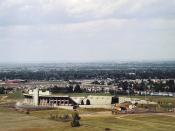The two poems, Thistles by Ted Hughes and Tall Nettles by Edward Thomas, have different and contrasted views on nature and its struggle with humans and environment. While Edwards has a more lazy view, Hughes takes a more aggressive approach as he describes the natural world. This essay will compare both Tall Nettles and Thistles, looking at the various ways the two poets look at nature and convey this.
Edward Thomas portrays the struggle between nature and man in his poem, in a way that suggests that nature is dominant over whatever man creates or does in a prolonged and gentle way. The poem gives the sense that man is being overpowered by the concepts of time and nature. There is a large emphasis on time and its effects on mankind. "Tall nettles cover up, as they have done, /These many springs, the rusty harrow, the plough" suggests that the nettles have slowly grown over time, overwhelming these tools that man has made to control nature.
The poet then goes on to convey this unruly state as a beauty in itself. "This corner of the farmyard I like most" shows how the poet views this powerful thought of nature as a scene worth watching. Yet he shows that the only thing these nettles will give way to are the elements, which are all-powerful. "Never lost except to prove the sweetness of a shower" shows how the nettles, which represent nature, submit to the element of water. This further portrays man's inability to control and cultivate the powers of the natural world.
While Ted Hughes still portrays the struggle between man and nature in "Thistles", he suggests that this struggle is in more of a cyclic way as well as it being more violent. Throughout the poem, the feeling of...


